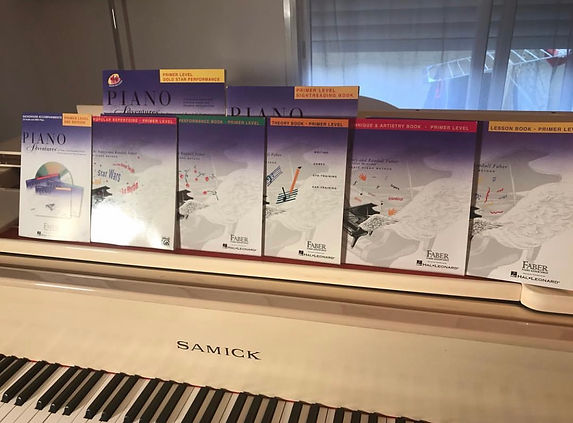IN DOING SOMETHING...
Do it with love or never do it at all
Mahatma Gandhi
I devise a balanced curriculum for each student based on Analysis, Creativity, Expression, Musical Imagination, Technique, Musical Literature, Musicianship :
-
by combining traditional teaching,
-
use of digital devices to prepares students for the ear-test and sight-reading,
-
teaching by imitation and observation that brings lots of interactions for students' progress.
Three mains programs :
* The « Music for Little Mozart » method to encourage a love for music in young children, ages 3-6, and to help them begin learning to play piano.
* The « Piano Adventure » Curriculum by Faber designed to take into account all essentials elements for piano playing.
* The Royal Conservatory of Music (RCM - Canada) curriculum offers the collection of piano literature "Piano Syllabus » included a wide variety of styles, textures, forms, and challenges for an enriched learning experience.
*******
MUSIC FOR LITTLE MOZART
A course designed for preschool age students (3-5 years old) that provides a comprehensive approach to musical learning, using the piano over, a two year period.

The lesson is the heart of the course. Students are introduced to new musical concepts and to the interpretation of pieces on the piano.
The story of the Beethoven Bear and the Mozart Mouse sets the stage for early music study and continues throughout learning. Other characters also serve as a springboard to introduce students to the main composers of the four main periods of musical style.
New concepts are introduced and carefully reinforced throughout the book. Each lesson contains a piece of the story as a backdrop for each new concept or new piece of music, as well as practical instructions for the student to read.
The music has been written to develop finger dexterity in young children and includes artful lyrics that will appeal to the imagination of the student.
PIANO ADVENTURES PROGRAM
The student-centered approach method uses analysis, creativity and expression to develop a "musical mind and heart".
The delightful pianistic pieces and creative theory pages, combined with an outstanding technical approach encourage practice and progress with adventure !
Piano Adventures curriculum offers 8 levels.

ROYAL CONSERVATORY of MUSIC PROGRAM
The RCM program also fosters students'curiosity and creativity, instilling in students an understanding, appreciation and love of music throughout life.
It allow each of them to qualify for remote evaluation/exams by internationally recognized RCM Examiner.

Why choose the Royal Conservatory Music Program ?
In line with my pedagogical priorities at elementary levels, when moving on to the next piece, the student always reviews the previous lesson and brings together all the skills already learned and when planning a lesson, I consider six essential elements and create a plan for each of them to develop skills:
1. Repertoire
-
Each level includes a broad selection of pieces representing a variety of styles and periods.
-
Repertoire selections are leveled progressively in difficulty.
-
Periodic reviews of the repertoire keep the selections fresh and innovative.
-
Teacher and the student can add favorite pieces through the Teacher’s Choice and Own Choice selections.
2. Technique
-
Each level of technique is designed to support the demands of the repertoire for that level.
-
Technique includes scales, chords, arpeggios, patterns, and études.
3. Musicianship
-
A thoughtful and consistent approach to the development of reading and aural skills.
-
Musicianship skills are developed in conjunction with repertoire goals and requirements.
-
Musicianship skills give students a solid foundation for independent creative musical explorations.
.
4. Musical Literacy
-
The Music Development Program’s academic subjects support students in acquiring the theoretical and historical knowledge necessary for music literacy.
-
Away from the piano, students accomplish Rhytmic activities to assist in developing their sense of ryhthm.
5. Theory
-
Theoretical levels are tied to practical (performance) levels, reinforcing concepts encountered in repertoire, technique, and musicianship studies.
6. Musical Literacy
-
At-the-keyboard assessments of keyboard harmony and musicianship present students with an opportunity to develop skills in improvisation and composition.
With this comprehensive program, students acquire discipline, develop imagination and boost perseverance that will serve them tremendously in all facets of their lives.


